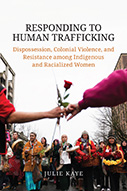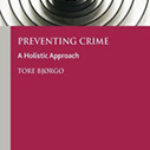RESPONDING TO HUMAN TRAFFICKING: DISPOSSESSION, COLONIAL VIOLENCE, AND RESISTANCE AMONG INDIGENOUS AND RACIALIZED WOMEN

Author: Julie Kaye
Publisher: Toronto, ON: University of Toronto Press, 2017. 180p.
Reviewer: Emily van der Meulen | January 2018
Julie Kaye’s excellent and much needed intervention into contemporary trafficking debates is a must read for scholars in criminology, women’s studies, indigenous studies, sociology, and policy studies, as well as for community activists and workers in violence against women, social justice, and harm reduction organizations. Based on extensive qualitative research, including dozens of interviews and focus groups, and informed by Kaye’s own experience working in the social services, this text expertly weaves participant narratives and interview excerpts with critical and theoretically informed analyses of Canada’s settler colonial context. Her participant sample is comprised of a range of professionals and others engaged in anti-trafficking efforts (for example, policy makers, government officials, frontline workers, law enforcement, and more), as well as sex workers and people who have experienced trafficking or forced migration themselves – in other words, individuals who are on the receiving end of the problematic policies, programs, and strategies often deployed by the very professionals who are engaged in anti-trafficking work. The study’s geographic scope includes Vancouver, British Columbia, Calgary, Alberta, and Winnipeg, Manitoba, but the results are illustrative of the larger, national anti-trafficking milieu in Canada.
Kaye’s analytic grounding of anti-trafficking discourses in the context of settler colonialism makes Responding to Human Trafficking a profound contribution both to public and policy debates on the topic and to the literature more broadly. In advancing her analysis, Kaye explores and problematizes the representations of, and tensions between, ‘domestic’ versus ‘international’ trafficking, showing how these discourses shape exclusionary immigration policies as well as contribute to state violence against sex workers. Since the discourse surrounding domestic trafficking in Canada has focused almost exclusively on the experiences of Indigenous women and girls, developing an analysis of settler colonialism and Indigenous sovereignty, as Kaye does, is imperative for advancing a sustained and valid critique. Likewise, conceptions of international trafficking as cross border movement or migration, primarily of racialized women, necessitates an exploration of restrictive border control policies, racist and sexist nation-building projects, and global capitalism – topics with which Kaye engages throughout the book. Solidarity between and among sex working, migrant, and Indigenous communities can importantly draw attention to the ways in which anti-trafficking discourse has led to policy and criminal justice interventions and reforms that run counter to their supposed aims. Kaye’s well-developed and deep engagement with the research, policies, and people involved in anti-trafficking efforts showcases the many intersecting inequalities experienced by those constructed as ‘at risk’ and/or as ‘risky,’ and thus subject to the control and discipline of the colonial nation-state.
As Kaye writes in the book’s conclusion: “The considerable attention afforded to human trafficking and anti-trafficking responses in Canada shows no signs of decline” (p. 196). For this reason, among many, her critical examination of trafficking discourse is both necessary and ground-breaking. Many scholars, myself included, would agree with Kaye’s argument that the current iteration of the trafficking framework is not salvageable. Instead, recognizing the myriad harms caused in the name of anti-trafficking – felt, in particular, by Indigenous women and girls as well as gendered and racialized migrants – opens the door to a more complex understanding of agency, self-determination, and sovereignty, and to the potentials of migrant, sex worker, and Indigenous resistance.
Emily van der Meulen is an Associate Professor in the Department of Criminology at Ryerson University, Toronto, Canada.


